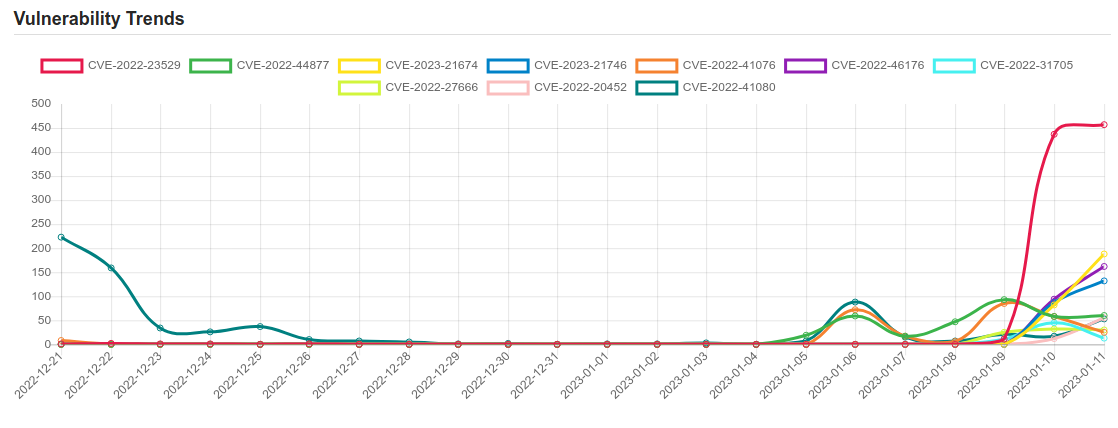Daily Vulnerability Trends: Thu Jan 12 2023

| CVE NAME | CVE Description |
| CVE-2022-20452 | In initializeFromParcelLocked of BaseBundle.java, there is a possible method arbitrary code execution due to a confused deputy. This could lead to local escalation of privilege with no additional execution privileges needed. User interaction is not needed for exploitation.Product: AndroidVersions: Android-13Android ID: A-240138318 |
| CVE-2022-41080 | Microsoft Exchange Server Elevation of Privilege Vulnerability. This CVE ID is unique from CVE-2022-41123. |
| CVE-2020-28362 | Go before 1.14.12 and 1.15.x before 1.15.4 allows Denial of Service. |
| CVE-2022-36929 | The Zoom Rooms Installer for Windows prior to 5.12.6 contains a local privilege escalation vulnerability. A local low-privileged user could exploit this vulnerability during the install process to escalate their privileges to the SYSTEM user. |
| CVE-2022-36926 | Zoom Rooms for macOS clients before version 5.11.3 contain a local privilege escalation vulnerability. A local low-privileged user could exploit this vulnerability to escalate their privileges to root. |
| CVE-2022-36927 | Zoom Rooms for macOS clients before version 5.11.3 contain a local privilege escalation vulnerability. A local low-privileged user could exploit this vulnerability to escalate their privileges to root. |
| CVE-2022-47966 | No description provided |
| CVE-2022-27643 | No description provided |
| CVE-2022-36930 | Zoom Rooms for Windows installers before version 5.13.0 contain a local privilege escalation vulnerability. A local low-privileged user could exploit this vulnerability in an attack chain to escalate their privileges to the SYSTEM user. |
| CVE-2022-27255 | In Realtek eCos RSDK 1.5.7p1 and MSDK 4.9.4p1, the SIP ALG function that rewrites SDP data has a stack-based buffer overflow. This allows an attacker to remotely execute code without authentication via a crafted SIP packet that contains malicious SDP data. |
| CVE-2022-46169 | Cacti is an open source platform which provides a robust and extensible operational monitoring and fault management framework for users. In affected versions a command injection vulnerability allows an unauthenticated user to execute arbitrary code on a server running Cacti, if a specific data source was selected for any monitored device. The vulnerability resides in the `remote_agent.php` file. This file can be accessed without authentication. This function retrieves the IP address of the client via `get_client_addr` and resolves this IP address to the corresponding hostname via `gethostbyaddr`. After this, it is verified that an entry within the `poller` table exists, where the hostname corresponds to the resolved hostname. If such an entry was found, the function returns `true` and the client is authorized. This authorization can be bypassed due to the implementation of the `get_client_addr` function. The function is defined in the file `lib/functions.php` and checks serval `$_SERVER` variables to determine the IP address of the client. The variables beginning with `HTTP_` can be arbitrarily set by an attacker. Since there is a default entry in the `poller` table with the hostname of the server running Cacti, an attacker can bypass the authentication e.g. by providing the header `Forwarded-For: |
| CVE-2021-38003 | Inappropriate implementation in V8 in Google Chrome prior to 95.0.4638.69 allowed a remote attacker to potentially exploit heap corruption via a crafted HTML page. |
| CVE-2022-23529 | node-jsonwebtoken is a JsonWebToken implementation for node.js. For versions `<= 8.5.1` of `jsonwebtoken` library, if a malicious actor has the ability to modify the key retrieval parameter (referring to the `secretOrPublicKey` argument from the readme link of the `jwt.verify()` function, they can write arbitrary files on the host machine. Users are affected only if untrusted entities are allowed to modify the key retrieval parameter of the `jwt.verify()` on a host that you control. This issue has been fixed, please update to version 9.0.0. |
| CVE-2023-21746 | Windows NTLM Elevation of Privilege Vulnerability. |
| CVE-2022-41076 | PowerShell Remote Code Execution Vulnerability. |
|
A considerable amount of time and effort goes into maintaining this website, creating backend automation and creating new features and content for you to make actionable intelligence decisions. Everyone that supports the site helps enable new functionality.  To keep up to date follow us on the below channels.     
|


![Cobalt Strike Beacon Detected - 140[.]143[.]132[.]170:80 10 Cobalt-Strike](https://www.redpacketsecurity.com/wp-content/uploads/2021/11/Cobalt-Strike-300x201.jpg)